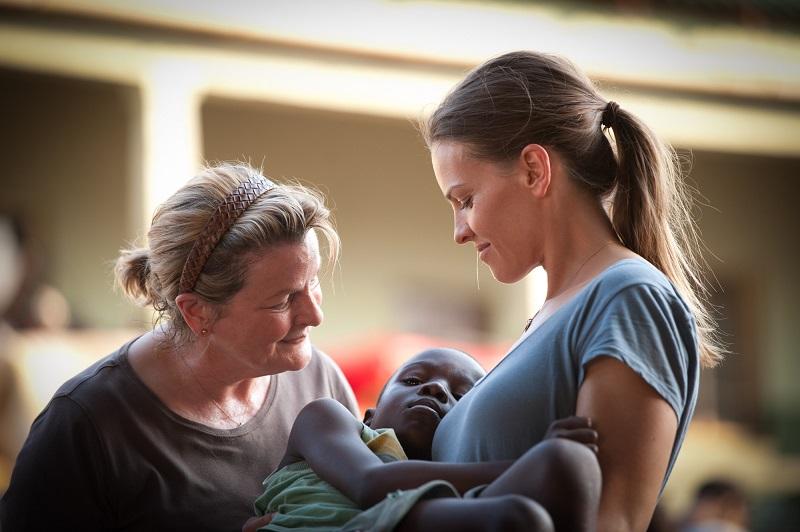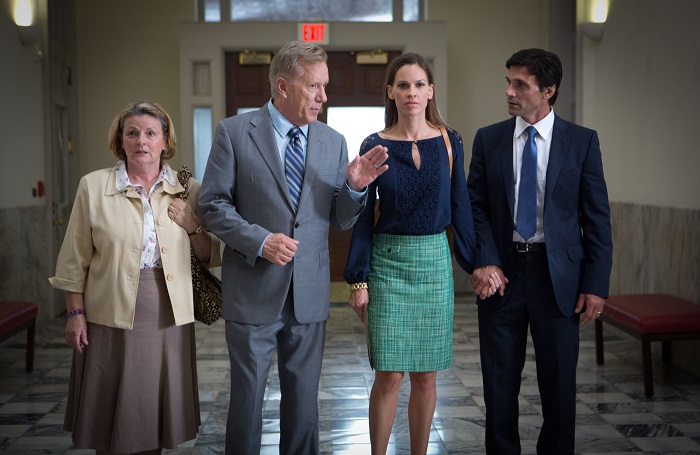Mary and Martha, BBC One | reviews, news & interviews
Mary and Martha, BBC One
Mary and Martha, BBC One
Richard Curtis turns from fact to fiction to raise awareness about malaria

It is now part of the fixtures and fittings on British television. Its original stars, once alternative comedians, have become leathery gerontosaurs of the establishment. And yet on Comic Relief the grammar of giving has been largely immune to evolution. A star – usually a comic - goes out to Africa and reports back from a community in dire need of a basic necessity to alleviate suffering and death. They mug charmingly for the camera, make friends with the children and ask for your money.
It’s a trusted method, but this year Richard Curtis has tried to shake things up a little. Rather than appeal to the audience’s finer feelings through a combination of laughter and facts, Mary and Martha is a work of fiction, and it’s notably light on comic relief. But the real game-changer is that Curtis here tugged on the heart strings by putting his First World characters in the line of fire.
There were fleeting glimpses of the Curtis who more or less invented the awkward British romcom
The drama told of two mothers united in grief by the dread scythe of malaria, which kills half a million people a year. Wealthy American housewife Mary (Hilary Swank) took her schoolboy son George (Lux Haney-Jardane) out to South Africa for six months to get him away from bullies and computer games. Before long he had been killed by a bite from a mosquito. Although by a neat dramatic sleight of hand we didn't see it happen, the same fate awaited Ben (Sam Claflin), the son of homespun Londoner Martha (Brenda Blethyn), who went off to Mozambique to teach and foolishly handed over his malaria pills to his pupils. In due course the women chanced to meet and, visiting Ben’s old school, found malaria continuing to cut a swathe through his pupils. With not much of a marriage to go home to, Martha stayed on to help, while Mary returned to a large, echoing home fired by the need to intervene in the politics of overseas aid, despite the scepticism of her husband and yoga-mat friends.
 Curtis has been this way before. In The Girl in the Café (2005) he came at Third World debt via a love affair between a civil servant and a campaigner. It’s a tricky ridge to traverse: can the film raise awareness and if possible donations while also offering a satisfying story? Even when not delivering a lecture in a dog collar, Curtis for all his undoubted humanity has never been the most layered dramatist. The tears shed by Swank and Blethyn, and the back stories lending their characters a basic sort of substrata, could not quite erase the whiff of the well-meaning infomercial. James Woods as Swank’s unloving, work-obsessed father was a creation of purest cardboard. There were only fleeting glimpses of the Curtis who more or less invented the awkward British romcom. Mary asked Martha why she married her lumpen husband. “Well,” said Blethyn, “he was very polite.”
Curtis has been this way before. In The Girl in the Café (2005) he came at Third World debt via a love affair between a civil servant and a campaigner. It’s a tricky ridge to traverse: can the film raise awareness and if possible donations while also offering a satisfying story? Even when not delivering a lecture in a dog collar, Curtis for all his undoubted humanity has never been the most layered dramatist. The tears shed by Swank and Blethyn, and the back stories lending their characters a basic sort of substrata, could not quite erase the whiff of the well-meaning infomercial. James Woods as Swank’s unloving, work-obsessed father was a creation of purest cardboard. There were only fleeting glimpses of the Curtis who more or less invented the awkward British romcom. Mary asked Martha why she married her lumpen husband. “Well,” said Blethyn, “he was very polite.”
Mary and Martha was very polite too, even at the moment when the two women fetched up lecturing a congressional committee on funding for disease prevention about the genocidal impact of malaria. Curtis has always expertly manipulated his audience’s emotions – egregiously so in Love, Actually. The oddity is, with director Philip Noyce also pulling the strings, that he managed it all over again. It’s a shrewd calculation: ashes to ashes, dust to dust, where facts won’t get them, fiction must.
Add comment
The future of Arts Journalism
You can stop theartsdesk.com closing!
We urgently need financing to survive. Our fundraising drive has thus far raised £49,000 but we need to reach £100,000 or we will be forced to close. Please contribute here: https://gofund.me/c3f6033d
And if you can forward this information to anyone who might assist, we’d be grateful.

Subscribe to theartsdesk.com
Thank you for continuing to read our work on theartsdesk.com. For unlimited access to every article in its entirety, including our archive of more than 15,000 pieces, we're asking for £5 per month or £40 per year. We feel it's a very good deal, and hope you do too.
To take a subscription now simply click here.
And if you're looking for that extra gift for a friend or family member, why not treat them to a theartsdesk.com gift subscription?
more TV
 Murder Before Evensong, Acorn TV review - death comes to the picturesque village of Champton
The Rev Richard Coles's sleuthing cleric hits the screen
Murder Before Evensong, Acorn TV review - death comes to the picturesque village of Champton
The Rev Richard Coles's sleuthing cleric hits the screen
 Black Rabbit, Netflix review - grime and punishment in New York City
Jude Law and Jason Bateman tread the thin line between love and hate
Black Rabbit, Netflix review - grime and punishment in New York City
Jude Law and Jason Bateman tread the thin line between love and hate
 The Hack, ITV review - plodding anatomy of twin UK scandals
Jack Thorne's skill can't disguise the bagginess of his double-headed material
The Hack, ITV review - plodding anatomy of twin UK scandals
Jack Thorne's skill can't disguise the bagginess of his double-headed material
 Slow Horses, Series 5, Apple TV+ review - terror, trauma and impeccable comic timing
Jackson Lamb's band of MI5 misfits continues to fascinate and amuse
Slow Horses, Series 5, Apple TV+ review - terror, trauma and impeccable comic timing
Jackson Lamb's band of MI5 misfits continues to fascinate and amuse
 Coldwater, ITV1 review - horror and black comedy in the Highlands
Superb cast lights up David Ireland's cunning thriller
Coldwater, ITV1 review - horror and black comedy in the Highlands
Superb cast lights up David Ireland's cunning thriller
 Blu-ray: The Sweeney - Series One
Influential and entertaining 1970s police drama, handsomely restored
Blu-ray: The Sweeney - Series One
Influential and entertaining 1970s police drama, handsomely restored
 I Fought the Law, ITVX review - how an 800-year-old law was challenged and changed
Sheridan Smith's raw performance dominates ITV's new docudrama about injustice
I Fought the Law, ITVX review - how an 800-year-old law was challenged and changed
Sheridan Smith's raw performance dominates ITV's new docudrama about injustice
 The Paper, Sky Max review - a spinoff of the US Office worth waiting 20 years for
Perfectly judged recycling of the original's key elements, with a star turn at its heart
The Paper, Sky Max review - a spinoff of the US Office worth waiting 20 years for
Perfectly judged recycling of the original's key elements, with a star turn at its heart
 The Guest, BBC One review - be careful what you wish for
A terrific Eve Myles stars in addictive Welsh mystery
The Guest, BBC One review - be careful what you wish for
A terrific Eve Myles stars in addictive Welsh mystery
 theartsdesk Q&A: Suranne Jones on 'Hostage', power pants and politics
The star and producer talks about taking on the role of Prime Minister, wearing high heels and living in the public eye
theartsdesk Q&A: Suranne Jones on 'Hostage', power pants and politics
The star and producer talks about taking on the role of Prime Minister, wearing high heels and living in the public eye
 King & Conqueror, BBC One review - not many kicks in 1066
Turgid medieval drama leaves viewers in the dark
King & Conqueror, BBC One review - not many kicks in 1066
Turgid medieval drama leaves viewers in the dark
 Hostage, Netflix review - entente not-too-cordiale
Suranne Jones and Julie Delpy cross swords in confused political drama
Hostage, Netflix review - entente not-too-cordiale
Suranne Jones and Julie Delpy cross swords in confused political drama

Comments
We loved the program!! Was
It's called The Highway Man'
one of the songs their driver
the song called "After You"
It was brilliant!!! As a
Sorry, but I wasn't really
I agree with you on the movie
Such an amazing film, we
Thank you so much for finding
Does anyone know if a book
what is the song kalled that
It's called Gabriel by Lamb.
Found it- Beatrice Miller is
I loved the movie, excellent
Does anyone know the name of
Chastity Brown - After You